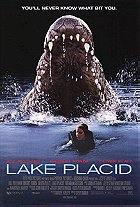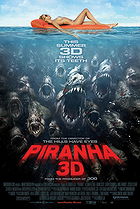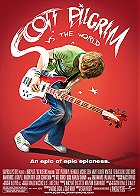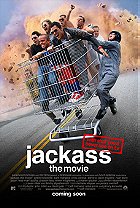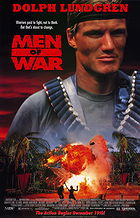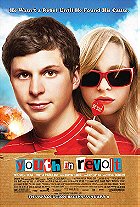Only the English filmmaking industry could successfully employ the concept of a sombre funeral service as a foundation on which to construct an eccentric black comedy. A clever, lively creation, 2007's Death at a Funeral is the latest comedy to be helmed by American director Frank "voice of Yoda" Oz, whose past hits include Dirty Rotten Scoundrels and Bowfinger. Despite having been directed by an American, Death at a Funeral retains a distinctly English flavour, as it's blessed with an English country setting, populated by predominantly English actors, and supported by a witty screenplay courtesy of Dean Craig. While clichéd, at times predictable, and occasionally more awkward than funny, Death at a Funeral is an energetic, wily motion picture. Eschewing flimsy gags and flashy special effects in favour of strong comedic performances and a brisk pace, Oz has crafted a top-notch black comedy.

At the centre of Death at a Funeral is real-life married couple Matthew Macfadyen and Keeley Hawes playing Daniel and Jane; the film's straight men who exist to navigate through the madness that is to come. As the film opens, Daniel is trying to get a funeral underway to give his deceased father a dignified send-off. Daniel is soon joined by a cavalcade of family and friends who are gathering to pay their respects. Plenty of chaotic events unfold throughout the course of a few hours as the eccentric supporting cast are introduced, each of whom have their own troubles to deal with.
The stories of the respective characters play out simultaneously, with the camera leaping from one to the next. It's chaotic, to be sure, and some of the characters are not given enough to do, but this permits a glorious fast pace. With the oddball scenarios, the frenetic antics and the protagonist's struggle to maintain normality, Death at a Funeral is at times notably reminiscent of the classic UK television series Fawlty Towers, except it's without the manic genius of John Cleese. On that note, Death at a Funeral is not as funny as it had the potential to be. It's more of a mild torrent of hilarity than an all-out laugh-fest from beginning to end. Worse, there are flat jokes, with situations that are dark and uncomfortable rather than funny. Due to this, Death at a Funeral received a fairly mixed reception. One's taste for black comedies will determine whether you're a fan, a hater, or somebody in between.

Expanding upon the lack of laughs, Death at a Funeral demands patience, as the first half is lacklustre in the humour department. There are a few laughs, sure, but the pickings are slim for the better part of 40 minutes. Fortunately, though, even during its barren stretches, Death at a Funeral remains watchable and entertaining. Director Oz and screenwriter Craig managed to infuse the film with a pervasively affable atmosphere that effectively compensates for the less-than-hilarious nature of the film's first half. Added to this, the filmmakers managed to do something rare: build momentum. The nearer the film gets to the end credits, the faster and more furious the jokes come. Granted, there's a bit of unnecessary bathroom humour and nudity, but the movie never sinks into the realm of bad taste. Oz and Craig even inserted a eulogy towards the film's end that's heartfelt and touching without seeming forced, tacked-on, or out of place.
Admittedly, the picture is populated with the type of stock characters one would expect to see in a film like this: the cad, the comic relief, the invalid, the favourite son, and so on. Yet, these roles were brought to life by such an ideal cast that it barely matters. Matthew Macfadyen is a terrific straight man capable of delivering side-splitting dialogue without ever seeming in on the joke. Meanwhile, American actor Alan Tudyk (of Firefly and Serenity fame) steals the show here as a character who ingests a potent LSD mixture and gets involved in hilarious shenanigans as a consequence. Veteran character actor Peter Vaughan also deserves full props for effortlessly pulling off the role of Uncle Alfie; a handicapped old man who has a profane expression for every situation. Adding to the insanity is Andy Nyman as the hypochondriac who's constantly left to deal with Alfie, a rubber-faced Ewan Bremner who spends his time at the funeral trying to win back his now-engaged former love interest, and a funny Rupert Graves as Daniel's well-respected brother, just to name a few. Frankly, I feel bad leaving some of the cast members out, as all of the actors are just terrific. Had John Cleese wandered into this funeral, he would have been right at home.

Death at a Funeral is most definitely a black comedy in the traditional sense, as humour is mined from grim situations. It's not perfect, but the positive aspects far outweigh the negatives. With a uniformly strong cast complementing the witty script, this is a lively, enjoyable and sophisticated piece of filmmaking. It's not as laugh-out-loud funny as it had the potential to be, but at least it at no point grows tiresome or aggravating, and that's more than what can be said for most contemporary comedies. Unfortunately, an American remake of the film was released in 2010, and the results were predictably dire.
7.3/10
 Login
Login
 Home
Home 183 Lists
183 Lists 1667 Reviews
1667 Reviews Collections
Collections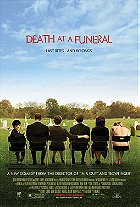
 0 comments,
0 comments, 


